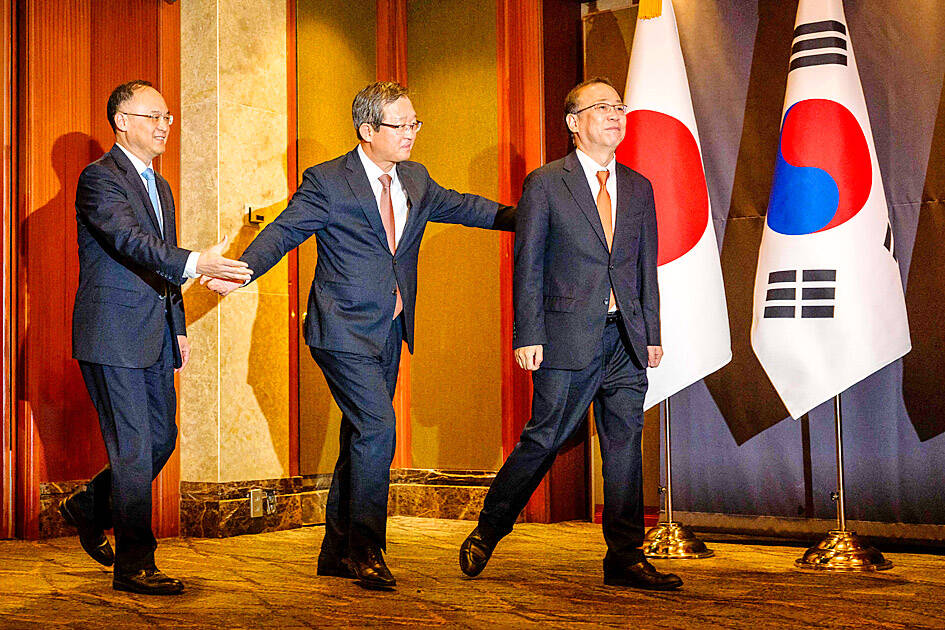Senior diplomats from South Korea, China and Japan yesterday agreed that their nations’ leaders would meet at the “earliest convenient time,” the South Korean Ministry of Foreign Affairs said after a rare meeting aimed at commencing trilateral exchanges.
The three nations had agreed to hold a summit every year starting in 2008 to foster regional cooperation, but that initiative has been frayed by bilateral feuds and the COVID-19 pandemic. The last summit was in 2019.
The ministry said in a statement that specific dates remained under discussion and that the nations’ foreign ministers would meet “in a couple of months.”

Photo: AFP
South Korea is this year’s host for three-way meetings and has proposed a summit in late December, Japanese broadcaster TBS reported.
Japanese Minister of Foreign Affairs Yoko Kamikawa said the three nations share the need to restart high-level talks, including summits, “as soon as possible.”
“I believe it is very valuable to discuss the various challenges the region faces,” she told a news conference in Tokyo.
The latest meeting was seen as partly intended to assuage Beijing’s concerns over the two US allies’ tightening cooperation after Seoul and Tokyo agreed this year to end legal, diplomatic and trade disputes over issues dating to Japan’s 1910 to 1945 occupation of Korea.
“We unanimously believe that carrying out cooperation is in the common interests of the three parties,” Chinese Ministry of Foreign Affairs spokesman Wang Wenbin (汪文斌) said yesterday. “We should work together to strengthen practical cooperation ... and make new contributions to regional peace, stability and prosperity.”
South Korean President Yoon Suk-yeol and Japanese Prime Minister Fumio Kishida have taken steps to mend ties and last month held a historic trilateral summit with US President Joe Biden, where the three vowed to boost cooperation, including on defense and economic security.
A senior South Korean official said China has been proactive in seeking trilateral cooperation and arranging meetings since bilateral ties soured over the deployment in 2017 of a US Terminal High Altitude Area Defense (THAAD) anti-missile system in South Korea.
“I’m sure there should be some discomfort on their side regarding our increasingly close trilateral security partnerships with the United States and Japan,” the official said, speaking on condition of anonymity because of the sensitivity of the situation. “There seems to be a view there that they need to properly manage bilateral ties with us, as they saw how their THAAD responses backfired and fueled anti-China sentiment to serious levels.”
Beijing would most likely look to leverage trilateral trade ties to counterbalance the US friend-shoring strategy, promote people-to-people exchanges, and enhance communication and dialogue with Seoul and Tokyo on security and defense matters, said Zhao Tong (趙通), senior fellow at the US-based Carnegie Endowment for International Peace.
Japan and South Korea have an interest in avoiding conflicts and maintaining a stable security relationship with China, he said.
“These shared interests open up new avenues for strategic communication, confidence-building and measures to prevent crises,” Zhao said.

A Chinese aircraft carrier group entered Japan’s economic waters over the weekend, before exiting to conduct drills involving fighter jets, the Japanese Ministry of Defense said yesterday. The Liaoning aircraft carrier, two missile destroyers and one fast combat supply ship sailed about 300km southwest of Japan’s easternmost island of Minamitori on Saturday, a ministry statement said. It was the first time a Chinese aircraft carrier had entered that part of Japan’s exclusive economic zone (EEZ), a ministry spokesman said. “We think the Chinese military is trying to improve its operational capability and ability to conduct operations in distant areas,” the spokesman said. China’s growing

Nine retired generals from Taiwan, Japan and the US have been invited to participate in a tabletop exercise hosted by the Taipei School of Economics and Political Science Foundation tomorrow and Wednesday that simulates a potential Chinese invasion of Taiwan in 2030, the foundation said yesterday. The five retired Taiwanese generals would include retired admiral Lee Hsi-min (李喜明), joined by retired US Navy admiral Michael Mullen and former chief of staff of the Japan Self-Defense Forces general Shigeru Iwasaki, it said. The simulation aims to offer strategic insights into regional security and peace in the Taiwan Strait, it added. Foundation chair Huang Huang-hsiung

PUBLIC WARNING: The two students had been tricked into going to Hong Kong for a ‘high-paying’ job, which sent them to a scam center in Cambodia Police warned the public not to trust job advertisements touting high pay abroad following the return of two college students over the weekend who had been trafficked and forced to work at a cyberscam center in Cambodia. The two victims, surnamed Lee (李), 18, and Lin (林), 19, were interviewed by police after landing in Taiwan on Saturday. Taichung’s Chingshui Police Precinct said in a statement yesterday that the two students are good friends, and Lin had suspended her studies after seeing the ad promising good pay to work in Hong Kong. Lee’s grandfather on Thursday reported to police that Lee had sent

BUILDUP: US General Dan Caine said Chinese military maneuvers are not routine exercises, but instead are ‘rehearsals for a forced unification’ with Taiwan China poses an increasingly aggressive threat to the US and deterring Beijing is the Pentagon’s top regional priority amid its rapid military buildup and invasion drills near Taiwan, US Secretary of Defense Pete Hegseth said on Tuesday. “Our pacing threat is communist China,” Hegseth told the US House of Representatives Appropriations Subcommittee on Defense during an oversight hearing with US General Dan Caine, chairman of the Joint Chiefs of Staff. “Beijing is preparing for war in the Indo-Pacific as part of its broader strategy to dominate that region and then the world,” Hegseth said, adding that if it succeeds, it could derail